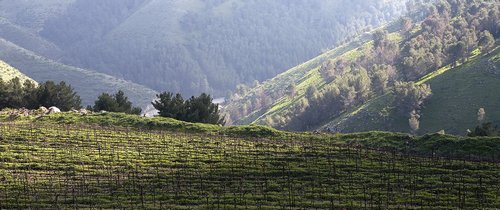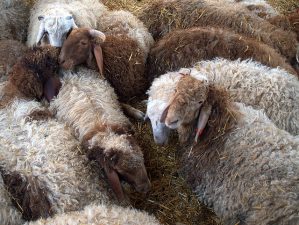(Image credit: Micah Vaadia, winemaker at Galil Mountain)
After reading and enjoying Green Prophet’s post on biking the Israeli wine scene, Green Prophet was kind enough to invite me to guest blog a short series of posts about the re-emerging Israeli wine phenomenon and about what’s new with organic winemaking in Israel.
I blog about wine from Israel and I own a specialty importer focused on introducing Americans to boutique wines and winemakers from Israel called Israeli Wine Direct.
First of all – who really cares about wine? There are a lot of other things we might drink, so what makes wine a food with a message for us?
And in a country where we can find hundreds and even thousands of wine brands in even a basic grocery store, who really cares about wine from Israel?
There’s more to wine than the great news about the health benefits of moderate wine drinking. From a sort of spiritual standpoint, it’s good to remember that wine was discovered by people; it was not created by people. (Actually, probably a bunch of monkeys first stumbled upon fermented grapes and then held a huge party!)
Wine occurs naturally with grapes just because of how they are made. All of the ingredients needed to make wine are in or on the grape already and just need to be combined with some sweetening from the sun. And, by the way, wine is the only food I know of that can taste like things that are clearly not in the wine – like cat’s pee, strawberries, leather, tar, dirt, blueberries, Jolly Rancher candy.
My 6th grade son knows this formula from science class………
SUGAR + YEAST = ALCOHOL.
It’s all there in or on the grape (sugar inside and naturally occurring yeast on the skins). Wine doesn’t really need people to become itself (now, good wine is another story!).
When drinking wine next time maybe you’ll think about the natural transformation the grape has gone through to become wine – and to wish for some of that transformation for yourself.
Remember that the ingredients for that transformation have already been given to the grapes and spiritually to you in your life — you just may not be noticing. I think that’s the hidden meaning, by the way, of the blessing some Jews make before drinking wine (i.e., “hey, I want to be transformed the same way these grapes got transformed into wine, so work some magic on me, too!”).
There’s another concept you see a lot in the wine press that’s actually somewhat controversial and that is this idea of “terroir”, the notion that great wine actually can translate for the drinker the land that the grapes grew from. Matt Kramer of The Wine Spectator magazine refers to this as a great wine’s unique taste of “somewhereness“ (I love the way he put that).
Nothing better than wine I think connects us to the land and then translates the “land and the hand” — the literal ground and climate the grapes grew in plus some (hopefully only subtle) fine-tuning by the winemaker. Because of all this, wine can lend itself to natural, organic, low-intervention production.
Israeli wine especially — given the land’s ancient history, Israel’s many different mesoclimates (Israel is long and narrow like Chile, Italy, California, so it contains even in a very small space various weather regions), and the amazing stories of the people and places there — allows us to experience land and hand like few others. We like to say that when you are drinking wine from Israel, you are drinking The Future of Wine History, since the Eastern Mediterranean of which Israel is a part is the birthplace of wine (more on this topic next time).
Finally, nothing quite like wine has a way of bringing people together across distances and cultures. Winemaking is a hallmark of a nation’s civility and the ability of its people to interact harmoniously with the land. One of my hopes in introducing Americans to great wines and winemakers from Israel is that Israel might become even slightly positively “re-branded” in the minds of people who do not fully understand her people and history.
There are now approximately 200 wineries in Israel. In the next post I’ll lead a whirlwind tour of two thousand years of Israeli wine history.
Richard Shaffer
::Israel Wine Direct





As Richard said, Israeli wine is a great thing and tremendously undervalued and not recognized outside of our tiny little country. Spiritually, it’s very important in the Jewish tradition and also, as Eli Ben-Zaken of Castel says, far more environmentally friendly than Israel’s traditional agricultural exports such as oranges, as it uses far less water.
Hey James – I can’t seem to get past wine DRINKING but a great starter book for a small winemaker is “From Vines to Wines” by Jeff Cox. Then the next major text in the field is actually by the father of boutique Israeli winemaking Dr. Yair Margalit (I import 2 of his wines) – his book is called “Winery Technology and Operations – a handbook for Small Wineries”.
Karin – I actually think kids should be taught (moderately and in the proper settings of course) how to enjoy and appreciate good wine. The Friday night Shabbat table has become that place for us.
My mother (a Catholic) blames my interest in Judaism on wine; she drank kosher wine (Mogen David), when she was pregnant with me. So I subscribe to the spiritual side of wine, you are talking about Richard.
Karin
Hi Richard – welcome to the team, & great post!
I’m wanting to start making my own wine (I grew up with my mum’s elderberry, elderflower wines in the UK) … any tips on how to start?
james “at” greenprophet.com